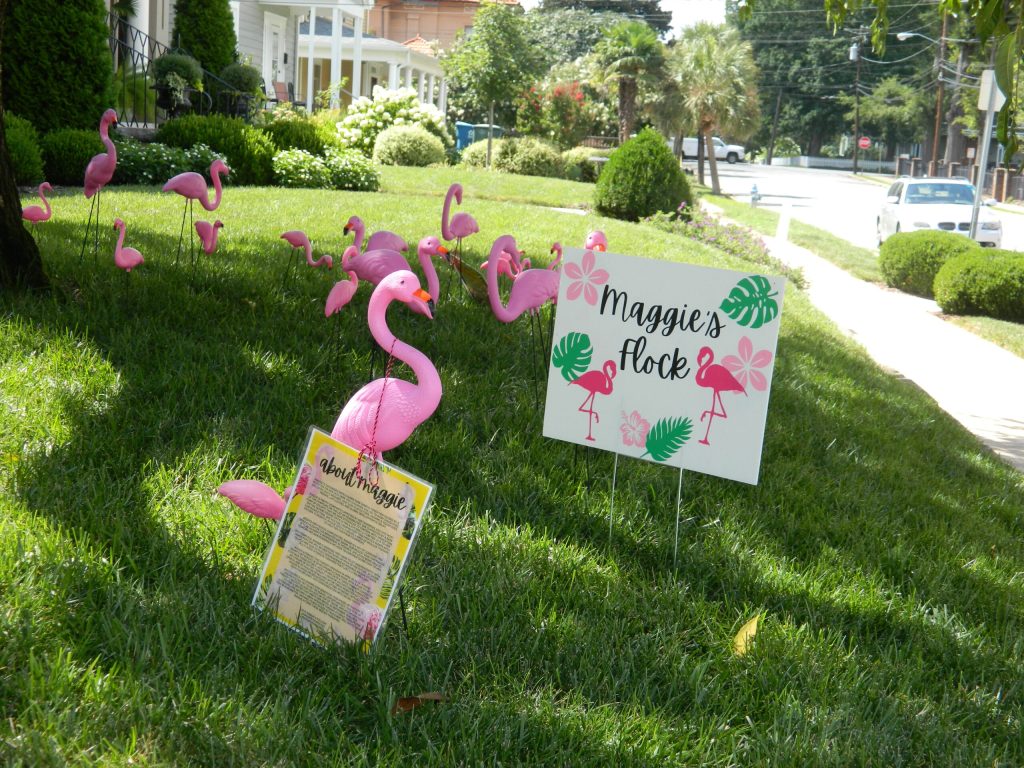Community flocks together to help support family
Published 12:10 am Wednesday, July 24, 2024

- One of the flocks of flamingoes, currently in the Beck's yard, share the story of Maggie Derby and how to participate in the fundraiser. — Karen Kistler
SALISBURY — Several flamingo flocks have been sighted in the Salisbury area, and wherever they land, they are helping support a good cause.
This flamingo flocking fundraiser was started to help three-year-old Maggie Derby and her parents, Blythe and Chris Derby, in their journey to receive medical help as little Maggie was born with a genetic disorder on her CASK gene, her mom said.
“Right now, there are less than 300 known cases worldwide,” Blythe said, and it mainly affects the brain.
As for Maggie, her cerebellum is very underdeveloped, she said and as a result, multiple things have been affected. These include her inability to sit independently, crawl, roll over or walk. She is also not able to eat by mouth, having to eat through a g-tube. Maggie also has a severe form of epilepsy, Blythe said.
While Maggie can’t speak verbally, she can definitely communicate, her mom said. “She has a lot of personality.”
The ongoing fundraiser, which was started by their neighbor Kelley Kisor, began with her sending the flock of flamingos to someone’s yard. The recipient of the flock can in turn donate to have the flock sent to another yard in the Salisbury area and it continues in this manner.
“It’s kind of like a chain of events,” she said.
On one of the flamingos, a special tag was placed sharing Maggie’s story and how the fundraiser works. There is also tag with a QR code on it, which can direct people to a GoFundMe, which has also been set up for her. For those wishing to donate in this way, go to https://www.gofundme.com/therapy-for-maggie-kicking-cask
What started as one flock of flamingos has now been separated, Blythe said, and “there are currently two flocks going right now.”
One of the flocks has landed on the corner of Jackson and West Fisher streets at the Beck home.
“It’s a wonderful cause,” said Sherry Beck, “and we were happy to be flocked.”
The couple’s plan is to take Maggie to Birmingham, Ontario to receive intensive therapy in September. And while she gets therapy at home during the week, her mom said, “for disorders like this, neuromotor disorders, it’s proven that an intensive model benefits them greatly.”
There they specialize in DMI therapy, which is dynamic movement intervention, Blythe said, which is different from the therapy she can receive at home.
Maggie will receive therapy three to four hours a day, five days a week for three weeks, and it will consist of physical, occupational and speech therapy. They also have Trexo robotics, which are robotic legs where she will be able to get into an upright position and walk for approximately 30 minutes every day.
While Blythe said she doesn’t know if Maggie will ever be able to fully sit up by herself, but she would “love to be able to give her the tools to get there or to find other ways that we can get that for her.”
And giving her those tools and helping Maggie gain as much independence as possible “and for her to be as happy as possible” is their goal for her and the time in Ontario, she said.
This fundraiser is a good one for exposure, Blythe said, to help more people learn about Maggie and the genetic disorder and reach out to additional people they might not know personally but they in turn can learn about it and reach more people.
“I think the best part for us is just the community involvement that we have for Maggie,” she said.


